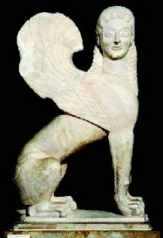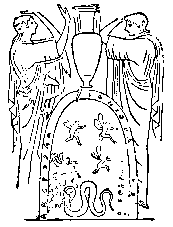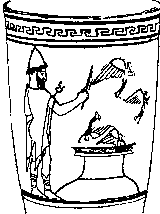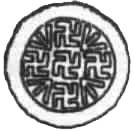HELLENIC RELIGION
The Psyche is a basic particle of matter, specially treated by physical means to become the psychic atom. These atoms are then eternal and exhibit gradual progress, by receiving and saving experiences; they develop conscience and then higher conscience. This painstaking process is made possible by successive metempsychoses, beginning in crystals (solid state of matter) and progressing through plants, animals, man etc. Psychogony - The Basic Principles
Hellenic Religion - Psychogony 
Does the Psyche really exist?The Hellenes have always believed in the existence of the Psyche. There is a strong conviction among all the philosophers that the psyche is the entity that eternally and most really exists. From the ancient Orpheus to Pythagoras, Plato, Aristotle (De anima), Plutarch, the Neoplatonists and Julian (the Emperor-Philosopher) this belief is persistent in our tradition. Edwin Rohde, in his monumental work "Psyche" analyses all the hellenic wisdom about the soul. Psychogony - The Basic Principles
Hellenic Religion - Psychogony 
What is the constituency of the Psyche?The Psyche is a material entity, an essential particle, generated exactly in the same way as the rest of Matter (here considered in its broader contemporary meaning, as the whole of Matter and Energy. In order that an essential particle (in the contemporary meaning of Physics) become a psychic atom, some heavy, energy requiring processing is needed, analogous to what is described in Plato Timaeus (35a).
Psychogony - The Basic Principles
Hellenic Religion - Psychogony 
What is the Psyche-Mind-Brain relationship?The Psyche is imprinted with experiences, leading to diversification and energetic enlargement of its organs, as it evolves through inorganic, organic and living Matter. This process of consecutive animation of several different coarsely material bodies is called Re-incarnation (term not restricted to animal life forms). Psychogony - The Basic Principles
Hellenic Religion - Psychogony 
How does Man evolve?Within the long and tenuous evolutionary process of the Psyche, the evolution at the level of Man is obviously most interesting to us. The evolution of Man can be achieved only in harmony with the Rhythm of the Cosmos, and in accordance with the Divine Law of Evolution. Man becomes virtuous when he realizes the Natural Law and works to the same direction with It. With Science and Arts, and by preserving the environment, Man joins, and can be integrated to, the Rhythm of the Cosmos. From a certain level and up, Man can only evolve by serving his community, city, state and nation. The utmost service was always considered to be self-sacrifice in the battle, by which the Citizen earns transition to the first step of the higher order of evolution of the Psyche: He becomes a Hero. Psychogony - The Basic Principles
Hellenic Religion - Psychogony 
Can Man evolve by his own effort?Within the whole Hellenic Philosophical setting, it is a well established belief, that man can evolve impressively with his own efforts, by means of cultivating his virtues: "virtue is more valuable than all gold, both on and under the earth" said Plato. That is what the mythical Heracles, the Dioscuri did way back in the mythological era; Leonidas of Thermopylae did exactly the same thing much closer to us, and was granted veneration as Hero after his "death", until the end of public worship in Hellas. The Gods love Man in a non-possessive, non-intervenening manner; they help him if he wants it sincerely and at specific thresholds of the evolutionary process. This help is by no means deprivation of Man's free will, can only serve to shorten the length of time of the evolutionary process and cannot change the course of evolutionary events. Psychogony - The Basic Principles
Hellenic Religion - Psychogony 
How does the Community evolve?The service of Man to his community, city, state and nation has the purpose to help the community evolve as a whole. These groups of people, according to the Hellenic religion, evolve by practicing freely their own customs, celebrate their own solemn festivals in public, and worship divinity in their own way. It follows that any tendency to proselytize or to impose one's customs, festivals and religion to anybody, has always been considered a blasphemy, in the context of the traditional Hellenic religion. In our time, and using modern terminology, we consider that not only as a blasphemy, but as racism too. We oppose any kind of missionary approach of other cultures, even bringing food and medicine (missions of monotheistic religions-organizations). They disturb spiritual evolution of others and are deleterious to national dignity and national economy. Psychogony - The Basic Principles
I am a child of Earth and of Starry Heaven

Helliniki Hetaireia Archaiophilon
Back to Top
|






